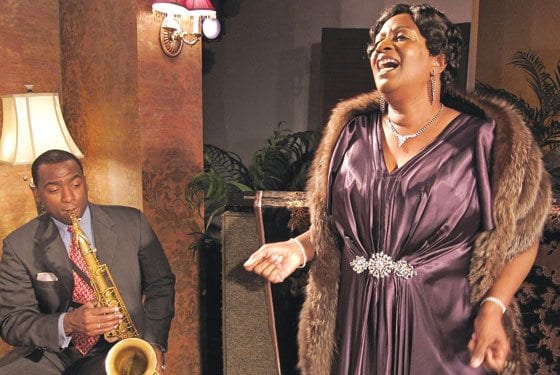
Decades before such supposed divas as Cher and Madonna, Bessie Smith proved to be the real thing. Honored with the title “Empress of the Blues,” the initially poor black preacher’s daughter actually sold enough records at Columbia Records to save the famed company from bankruptcy.
Possessing a powerful voice and a dynamic delivery, Smith made more than 160 recordings and sold more copies at the height of her popularity than anyone except Caruso and Jolson.
Gifted singer-actress Miche Braden, accompanied by a very talented trio of musicians, is bringing Smith’s achievement and uniqueness to life in the Off-Broadway play “ The Devil’s Music: The Life and Blues of Bessie Smith” at St. Luke’s Theatre (through Nov. 30).
Set by author Angelo Parra during the last year of Smith’s short life (1894-1937), “The Devil’s Music” plays out in a Memphis,Tennessee “buffet flat,” one of many private establishments where African Americans could find food, lodging, entertainment and refuge from white segregation.
Smith, dressed to the proverbial nines in bespangled evening wear, dazzles buffet flat patrons — here the audience itself — with a generous sampling of her hits and punctuates her musical line-up with details from her stormy life.
Moving around theatergoers in the cozy atmosphere of St. Luke’s Theatre, Braden as Smith provides the audience with a relative roller coaster ride through the ups and downs of the blues giant’s difficult life.
Parra’s play takes Smith from a sad Chattanooga, Tenn. childhood — orphaned from both parents (along with many siblings) at age nine — and traveling shows to the peak of popularity in the 1920s as a blues singer working with such fellow greats as Louis Armstrong and Benny Goodman. Smith had a major influence on the work of such diverse singers as Billie Holliday and Mahalia Jackson.
“The Devil’s Music” also gives ample attention to her crushing marital life — first ,the untimely death of her first husband Earl and the abuse and opportunism of her second husband Jack.
Parra does well evoking Smith’s exuberance and salty gutsiness as a performer who employed her own railroad car to move her show in an era of discrimination.
At the same time, Parra could do more in the early going with the impact of gospel on her music — perhaps with a spiritual number from her childhood.
Still, Braden’s electrifying performance as Smith supplies the complexity of her personality, life and blues repertoire when the play does not.
Look for a sassy rendition of “Tain’t Nobody’s Bizness If I Do,” a lush edition of “St. Louis Blues” and a heart-wrenching version of “I Ain’t Got Nobody.”
Also look for haunting moments in which Braden captures all of Smith’s vulnerability as a manipulated wife and a caring mother agonizing over her separation from her son who was taken out of her custody by a court that found her relationship with another woman more troubling than the abuse and infidelity of husband Jack.
Jim Hankins is very lyrical on bass and also serves as an occasional narrator — noting her death resulting from a car accident. Aaron Graves sparkles on piano, and Keith Loftis (Anthony F. Nelson Jr. sometimes alternates) is a standout on saxophone — most notably on “St. Louis Blues” and “Baby Doll,” where his playing provides sensual accompaniment to Braden’s visceral vocals.
Ma Rainey, as “The Devil’s Music” observes, was the “Mother of the Blues.” Braden’s majestic singing and blisteringly powerful performance are a timely reminder for blues buffs and a welcome opening for newcomers to the enormity of Bessie Smith’s talent and tenacity.


![Banner [Virtual] Art Gallery](https://baystatebanner.com/wp-content/uploads/2024/04/Cagen-Luse_Men-at-store-e1713991226112-150x150.jpg)

![Banner [Virtual] Art Gallery](https://baystatebanner.com/wp-content/uploads/2024/04/Cagen-Luse_Men-at-store-e1713991226112-848x569.jpg)

